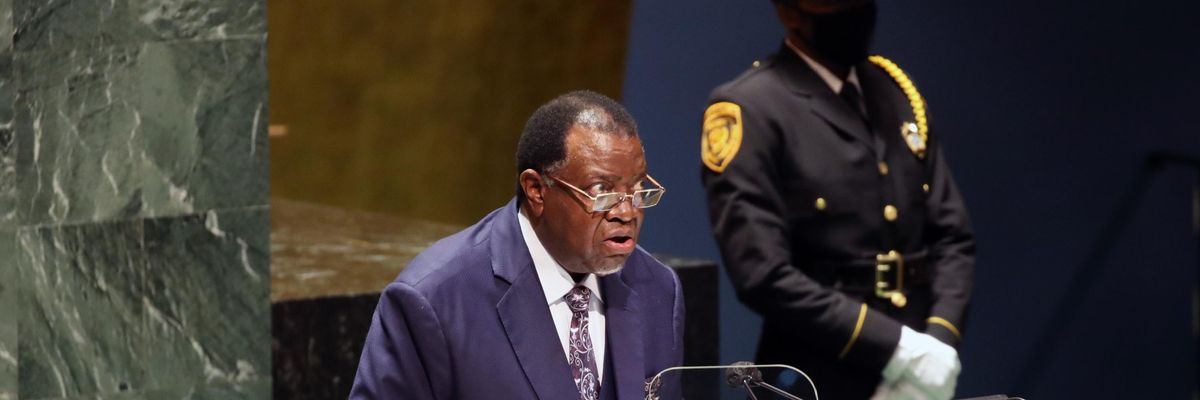The leaders of several African nations on Thursday blasted the system of "vaccine apartheid" that rich countries and pharmaceutical giants have created by hoarding doses and refusing to share key manufacturing technology, opting to prioritize profits and patent rights over ending the coronavirus pandemic everywhere.
Addressing the 76th session of the United Nations General Assembly via video conference, South African President Cyril Ramaphosa declared that vaccines are "the greatest defense that humanity has against the ravages of this pandemic."
"Unfortunately, the global rollout of the vaccine has not been impervious to the scourge of inequality."
"It is therefore a great concern that the global community has not sustained the principles of solidarity and cooperation in securing equitable access to Covid-19 vaccines," Ramaphosa said. "It is an indictment on humanity that more than 82% of the world's vaccine doses have been acquired by wealthy countries, while less than 1% has gone to low-income countries."
To date, just 3% of Africa's 1.3 billion-strong population has been fully vaccinated against the coronavirus, which has killed more than 200,000 people on the continent. World Health Organization officials warned last week that Africa is on track to receive 470 million fewer vaccine doses this year than previously expected, a shortfall that the WHO's Africa director blamed on "export bans and vaccine hoarding."
At the current pace of vaccination, nearly 80% of African nations are set to miss the WHO's goal of ensuring that at least 10% of every country's population is inoculated against Covid-19 by the end of September.
"Unfortunately, the global rollout of the vaccine has not been impervious to the scourge of inequality," President Hage Geingob of Namibia said during his speech at the U.N. General Assembly in New York.
African leaders also stressed that widespread vaccination is necessary to prevent the emergence of even more dangerous coronavirus mutations--potentially including a vaccine-resistant strain that would pose a threat not just to its nation of origin, but to the entire globe.
"We tend to forget that no one is safe until everyone is safe," said Tanzanian President Samia Suluhu Hassan, who took charge after the East African nation's former President John Magufuli--an opponent of coronavirus vaccines--died in March following speculation that he had contracted Covid-19.
Mahamat Idriss Deby Itno, the president of Chad, said Thursday that "the virus doesn't know continents, borders, even less nationalities or social statuses."
"The countries and regions that aren't vaccinated will be a source of propagating and developing new variants of the virus," said Itno. "In this regard, we welcome the repeated appeals of the United Nations secretary-general and the director-general of the [World Health Organization] in favor of access to the vaccine for all. The salvation of humanity depends on it."
Global inequities in vaccine access are so stark, lamented Angola President Joao Lourenco, that the United States, Germany, and other rich countries are beginning to offer third shots to segments of their populations while billions of people in poor regions are denied a single dose.
It is "shocking to see the disparity between some nations and others with respect to availability of vaccines," Lourenco said.
The African officials' scathing remarks came days after U.S. President Joe Biden convened a global coronavirus summit to discuss ways to ramp up vaccine production and distribution. While African public health experts applauded Biden's goal of reaching 70% global vaccination within the next year, they said meeting that target will require much speedier delivery of pledged donations and other critical steps, from technology transfer to urgent investments in regional manufacturing.
"We appreciate all the donations that were pledged by the rich countries and those who have doses to offer," Githinji Gitahi, chief executive of the charity Amref Health Africa, told the New York Times. "But we call for a commitment to deliver on those, and deliver in a timely manner."
The WHO's Regional Office for Africa said Thursday that in order for the continent to vaccinate 70% of its population by next September, monthly vaccine shipments will need to increase seven-fold--from roughly 20 million doses per month to 150 million per month, on average.
"This is about life and death for potentially millions of Africans so there is no time to waste in getting these shipments moving," said Dr. Matshidiso Moeti, the WHO's Africa director. "Actions speak far louder than words, and African countries need clear delivery dates so they can plan properly. We also need strong structures set up to ensure that all promises made are promises kept."
"Without widespread vaccination and other preventive measures," Moeti warned, "the continent's fourth wave is likely to be the most brutal yet."

